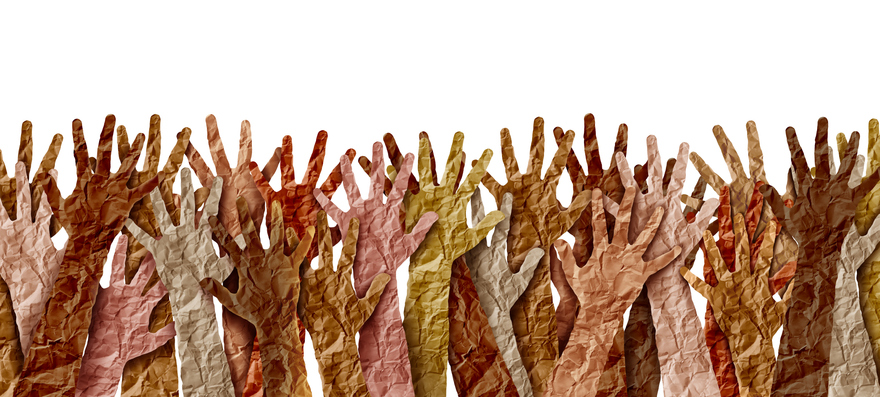We need to expand the landscape of democracy work
The work of protecting liberal democracy has grown since the 2016 election of Donald Trump. The landscape has been largely divided between national non-partisan organizations, which have focused on protecting democratic processes, and grassroots groups, which have focused on empowering everyday people to participate in our democracy. But this reconfigured field of democratic advocacy also requires a reevaluation of the resources available to organizers as well as a long-term vision of the future of our democracy.
Non-partisan national organizations, such as Protect Democracy, Campaign Legal Center, and Issue One, have focused on litigation and federal legislative advocacy to strengthen democratic systems and processes without taking policy positions. Issue-based national organizations, such as Planned Parenthood, the Debt Collective, and Color of Change, seek to advance policy positions and vary in their degree of focus on democratic systems and processes.
Meanwhile, grassroots organizers on both sides of the aisle, such as Mormon Women for Ethical Government, We the People Michigan, or Florida Rising, work at the state and local level. They mobilize people to vote, push for or against policies, and hold their elected officials accountable. Grassroots groups are also operating on the front lines of voter education in an environment of growing misinformation and threats of political violence.
The disconnect between the work and experience of national organizations (both those that are democracy-focused and those that are issue-based) and grassroots organizers means that the different elements of the pro-democracy political ecosystem are not working together as effectively as they could be. Democracy-focused national organizations are not engaging on policy issues that matter the most to voters. Progressive, issue-based national organizations are experiencing the new challenges in our democracy to varying degrees depending on their theories of change, including how much organizing they are doing. Moreover, national political funders are often not clear about what is happening at the grassroots — making it more challenging to provide effective polling, messaging guidance, research, and training for organizers on the ground.
For the progressive movement to be effective, national issue-based organizations and funders need to develop a sophisticated understanding of democracy and the threats to it and to commit to providing resources and supporting strategies to protect democracy on the ground through grassroots organizers. They also need to pair this sophisticated understanding with a thoughtful vision of how US democracy could evolve.
Beyond voting rights: understand the authoritarian playbook
Often, progressives treat democracy as synonymous with voting rights. National issue-based organizations in particular have thus far failed to consider all of the other areas that democracy scholars view as part of the playbook that authoritarians use to erode democracy. These moves include spreading misinformation, corrupting elections, politicizing independent institutions, quashing dissent, stoking violence, and marginalizing vulnerable communities. Since the election of Trump, the Republican Party has normalized lying, sowing doubt in election results, and promoting violence towards elected officials — changing the threats and challenges facing progressive organizers.
However, my experience with national progressive issue-based organizations and funders suggests that changes across these areas are not fully baked into our analysis of the political landscape or reflected in our strategies. Large progressive political funders of grassroots groups have struggled to identify resources or offer capacity-building support around these challenges. Most progressive political funders have no stated commitment to supporting organizations dealing with these types of threats. For example, there is a lack of resources to support organizers, candidates, and local election officials dealing with threats of violence. Similarly, there is still a limited amount of research regarding how organizers can effectively combat misinformation, and this lack is having a tremendous impact on organizers’ attempts to do voter education and mobilization.
Clarify commitments to democracy
Progressive organizations’ ideologies need to be well-developed not just on the political axis of left to right but also on the axis of democracy to authoritarianism. During the Trump administration, it was possible for those who were pro-democracy, regardless of ideological leaning, to work together due to the defensive nature of the work. In the absence of political power, a coalition spanning progressives and former Republicans did not need to align on policy priorities or proposals. Additionally, it was not necessary to have a shared view of whether passing a policy agenda or preserving institutions and democratic norms was more important. Coalition partners didn’t even have to oppose everything Trump proposed; it was enough to find shared goals and aligned strategies and work together on those.
For example, the Border Network for Human Rights, a grassroots group organizing border communities to change our immigration system, won a nationwide injunction against Trump’s border wall while represented by a legal team that included a non-partisan organization (Protect Democracy), a liberal law professor (Laurence Tribe), a center-right think tank (the Niskanen Center), and a lawyer who had worked under George H.W. Bush (Stuart Gerson). Coalitions of this sort were powerful in sending a clear message that some issues are beyond partisan politics and were persuasive to moderate or center-right decision-makers.
Once Democrats won governing power in 2020, albeit by slim margins, it became necessary for progressive organizations to get clear on priorities and policies to support in order to know what to advocate for. This is always true when the party most aligned with your values gains governing power. However, post-2020, new questions arose about democratic processes and structures. For example, organizations needed to decide whether they supported overturning the filibuster and wanted to advocate for Biden using his executive powers. For organizations rooted in progressive values and policy, but lacking a sophisticated understanding or ideology around democracy, these types of questions about democratic processes are rife with possibilities for internal conflict and confusion, particularly in regards to coalition partners.
In the absence of this clarity, the types of broad coalitions that were working together in the Trump years are beginning to fracture over differences in how much they prioritize democratic processes and improving them versus achieving policy outcomes. This does not have to be a binary choice: with authoritarian candidates losing traction in the last two election cycles there is also some breathing room for folks to be attentive to the deeper and more creative work to not only defend but truly build the world’s first multi-racial democracy.
Openings for national pro-democracy organizations and funders
There is a tremendous opportunity, as democracy expert Rachel Kleinfeld pointed out, to help democracy deliver for people by fixing its structural shortcomings and systematic failures to deliver for the average citizen.
Our political structures do not ensure that the majority’s perspectives are represented in Congress or in the presidential election. We can see this in the way the U.S. Constitution creates minority rule through the Senate and the Electoral College. And, of course, minority rule has been further entrenched through gerrymandering and legislation making it impossible to expand the House as the Constitution requires. Additionally, the Supreme Court decisions in Shelby County and Citizens United limit the ability of people to have their political views given equal weight. The Supreme Court itself can undermine or change policy in ways that contradict the views of the majority of Americans. Most national issue-based progressive organizations spend little or no resources working to address those concerns comprehensively and in a sustained way.
As a result, it’s extraordinarily difficult to implement even popular policies for systemic change championed by progressives. Our system of governance is unable to meet challenges that our founders didn’t contemplate, from automatic weapons to mass incarceration to childcare (with most people working outside the home) to climate change to technology that allows information to travel faster than ever and data to be harvested. A 2014 study demonstrated that when the economic elites support a given policy change it has about a one-in-two chance of being enacted. (The exact estimated probability is 45%.) When the elites oppose a given measure its chances of becoming law are less than one-in-five. As a result, in our system economic elites have a de facto veto on policy. The study also found that “The probability of policy change is nearly the same (around 0.3) whether a tiny minority or a large majority of average citizens favor a proposed policy change.” As a result, our policy outcomes are not reflecting the views of a majority of voters but, rather, those that manage to successfully navigate the process.
Addressing these challenges will take more than an assortment of reforms. Unfortunately, as outlined in the recently released Imagining Better Futures for American Democracy report, the U.S. democracy field is suffering from short-termism and a lack of positive visioning about what American democracy could evolve to become. Most democracy-focused organizations don’t think further out than two to four years and are mired in crisis framing and a scarcity mentality. There is a tremendous opportunity for work that takes a long-term and holistic view of the future of democracy in the United States. While this type of long-term holistic effort doesn’t exist yet in the U.S. democracy space, we can see global efforts to do this kind of thinking in the space of nuclear prohibition through projects like Horizon 2045.
I am working to launch an organization called Democracy 2076. One of its key projects is to center pro-democracy organizers who work across the political spectrum in envisioning what a Constitution could look like in the year 2076 and which would last for the following century of American democracy, and then build a campaign to achieve it. To my knowledge, it would be the first effort to reconceive the Constitution that centers the voices of organizers. Having a vision for the Constitution we want in 2076 and a campaign to achieve it would provide a holistic package of reforms and a north star orienting organizations to develop their programs. Finally, working towards an affirmative vision for our democracy would allow organizers to shift from a mentality of trying to out-organize authoritarianism cycle after cycle to a mentality where they are able to be on the offensive.

